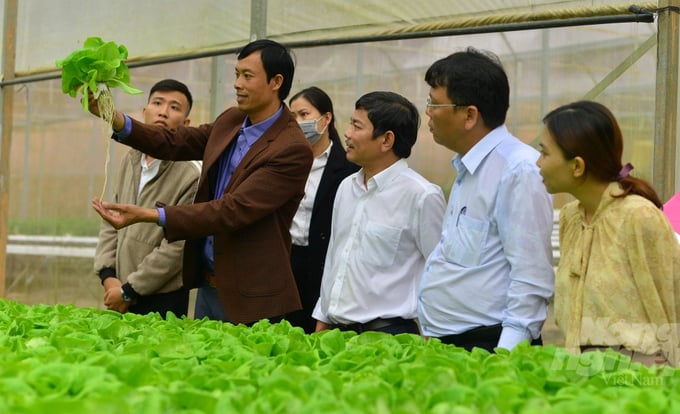June 17, 2025 | 01:13 GMT +7
June 17, 2025 | 01:13 GMT +7
Hotline: 0913.378.918
June 17, 2025 | 01:13 GMT +7
Hotline: 0913.378.918

Deputy Director of SPS Vietnam Ngo Xuan Nam (2nd from right) and Deputy Editor-in-Chief of Vietnam Agriculture Newspaper (3rd from right) survey the model of growing vegetables in greenhouses.
Project "Improving the effectiveness of the implementation of the Agreement on the application of Sanitary and Phytosanitary Measures (SPS) of the World Trade Organization (WTO) and SPS commitments within the framework of the Free Trade Agreements was just signed and promulgated by Deputy Prime Minister Tran Luu Quang today, June 19, in Decision No. 534/QD-TTg.
Accordingly, the project targets that by 2025, the rate of technical regulations on agricultural, forestry, and fishery food safety quality harmonized with international standards will reach 70%. At the same time, 100% of food safety and animal and plant quarantine management officers are trained and updated annually on professional expertise.
80% of critical products and corresponding markets have developed handbooks to guide compliance with SPS measures, and 100% of localities have perfected focal points for questions and answers on market SPS regulations.
The project also completed the construction of the National SPS Information Portal during this time to connect and share information on market SPS measures between cooperatives, businesses, associations, and local management agencies and in Vietnam's SPS system.
Oriented to 2030, the project strives to reach 100% of national standards and national technical regulations on agricultural, forestry, and fishery food safety quality that are equivalent to international standards. Additionally, the database should be promoted to connect interactive information between cooperatives, businesses, associations, local management agencies, and Vietnam's SPS system.
8 tasks, 9 solutions, and 10 priority activities are stated in the project. In particular, the Ministry of Agriculture and Rural Development has been assigned the key task of building a National Information Portal on SPS measures, which is expected to be deployed from 2024 to 2025.
In addition, based on the management field, the Ministry will review, amend, and supplement legal documents, national standards, and national technical regulations and evaluate the conformity related to Food safety management and animal and plant disease safety following international standards on SPS.
Communication activities and awareness raising about the SPS field for entities participating in the food management, production, processing, trade, and consumption chain have also been promoted.
Combined with that, the Ministry of Agriculture and Rural Development is also assigned to train human resources on Testing and verifying food safety; Risk assessment and risk-based management; Supervising, checking, inspecting, and handling food safety violations; Investigating, tracing, and handling food safety incidents.
The program to monitor, evaluate, and warn of food safety risks in agricultural and food products will be implemented by the Ministry of Agriculture and Rural Development in coordination with the Ministry of Health and the Ministry of Industry and Trade. Inter-ministries jointly invest in infrastructure, technical equipment, and resources for technical support points of the SPS Vietnam.
Translated by Huong Giang

(VAN) The working delegation from the Ministry of Agriculture and Environment conducted an important trip to the Netherlands to strengthen strategic partnerships and sustainable development in the agricultural sector.

(VAN) The letter ‘A Plea from the Ocean’ not only evokes emotion but also awakens the human conscience to the responsibility of protecting life on Earth.

(VAN) The Department of Agriculture in South Africa has announced the country’s first mass vaccination of poultry to prevent local birds from contracting avian influenza.

(VAN) Establishment of the Mekong Delta Regional Agricultural Linkage Center, aiming for a closed value chain, deep processing, trading platforms, and international market connectivity.

(VAN) Gia Lai province has recently recorded 460 rare species of animals and plants, contributing to forest conservation and biodiversity planning in the region.

(VAN) Ms. Caroline Beresford, New Zealand Ambassador to Vietnam, expressed confidence that agricultural cooperation between Vietnam and New Zealand will develop sustainably, be climate-resilient, and promote gender equality.

(VAN) Vietnam reaffirms its commitment to international cooperation in fostering sustainable and responsible fisheries while ensuring resilient livelihoods for small-scale fishing communities.